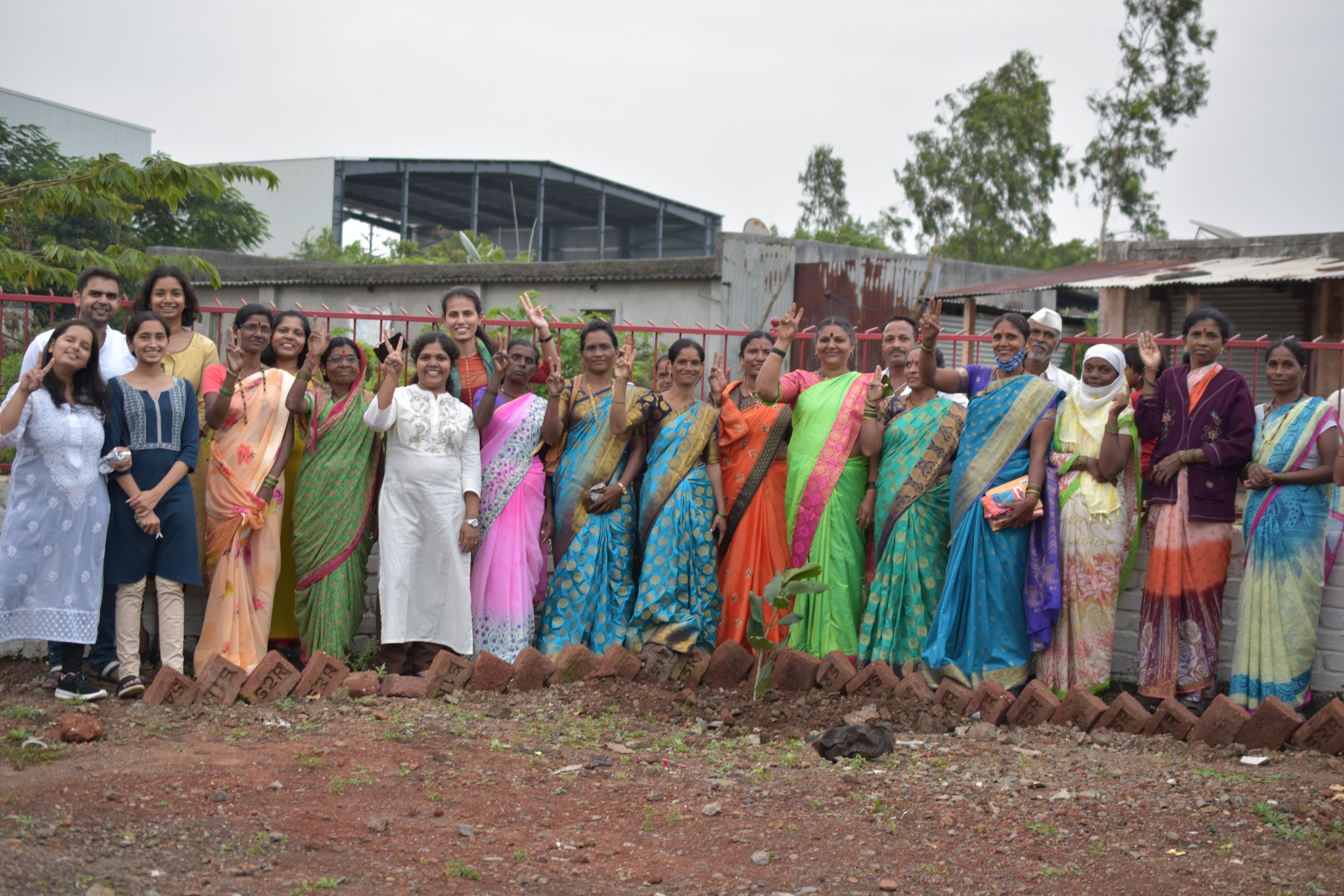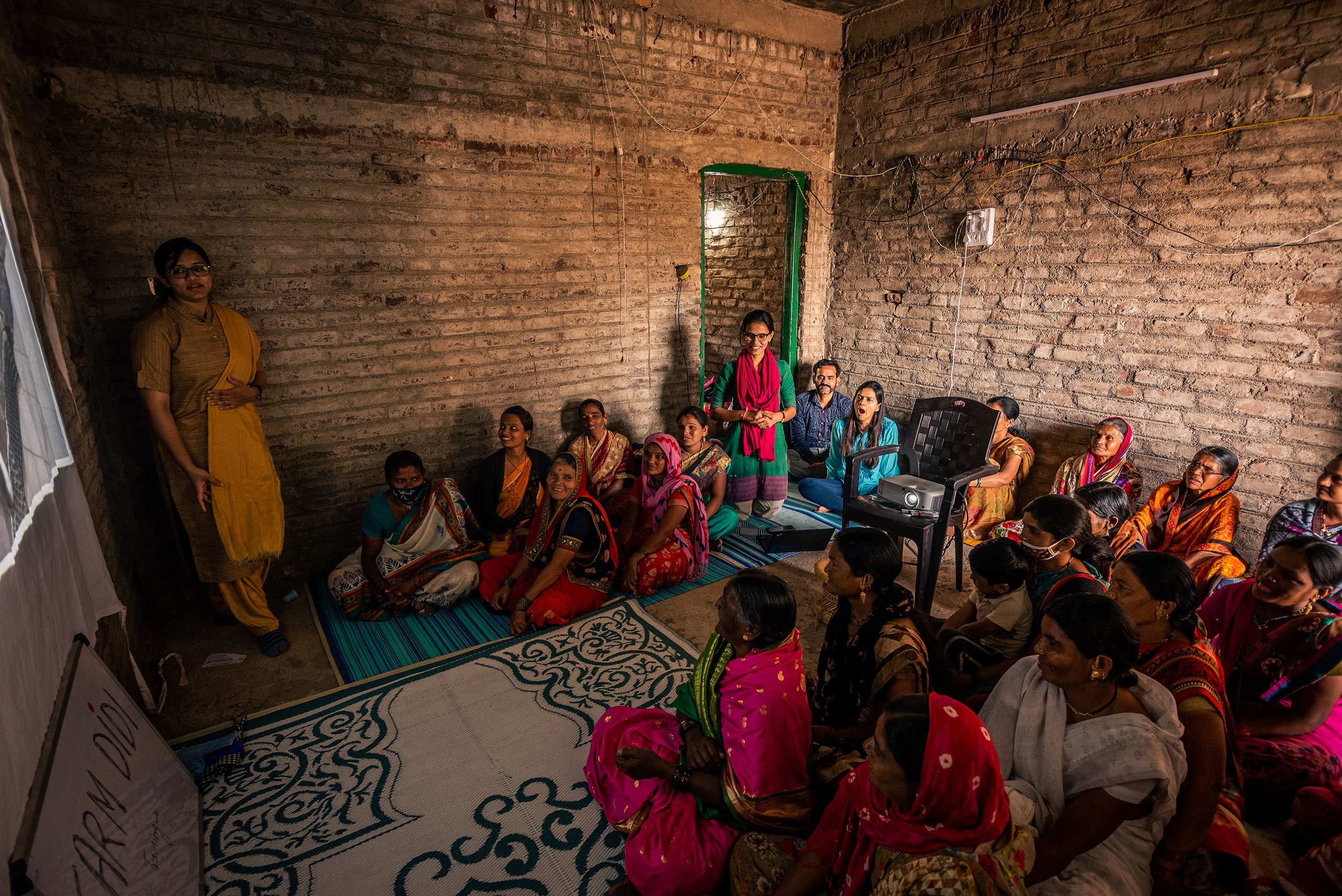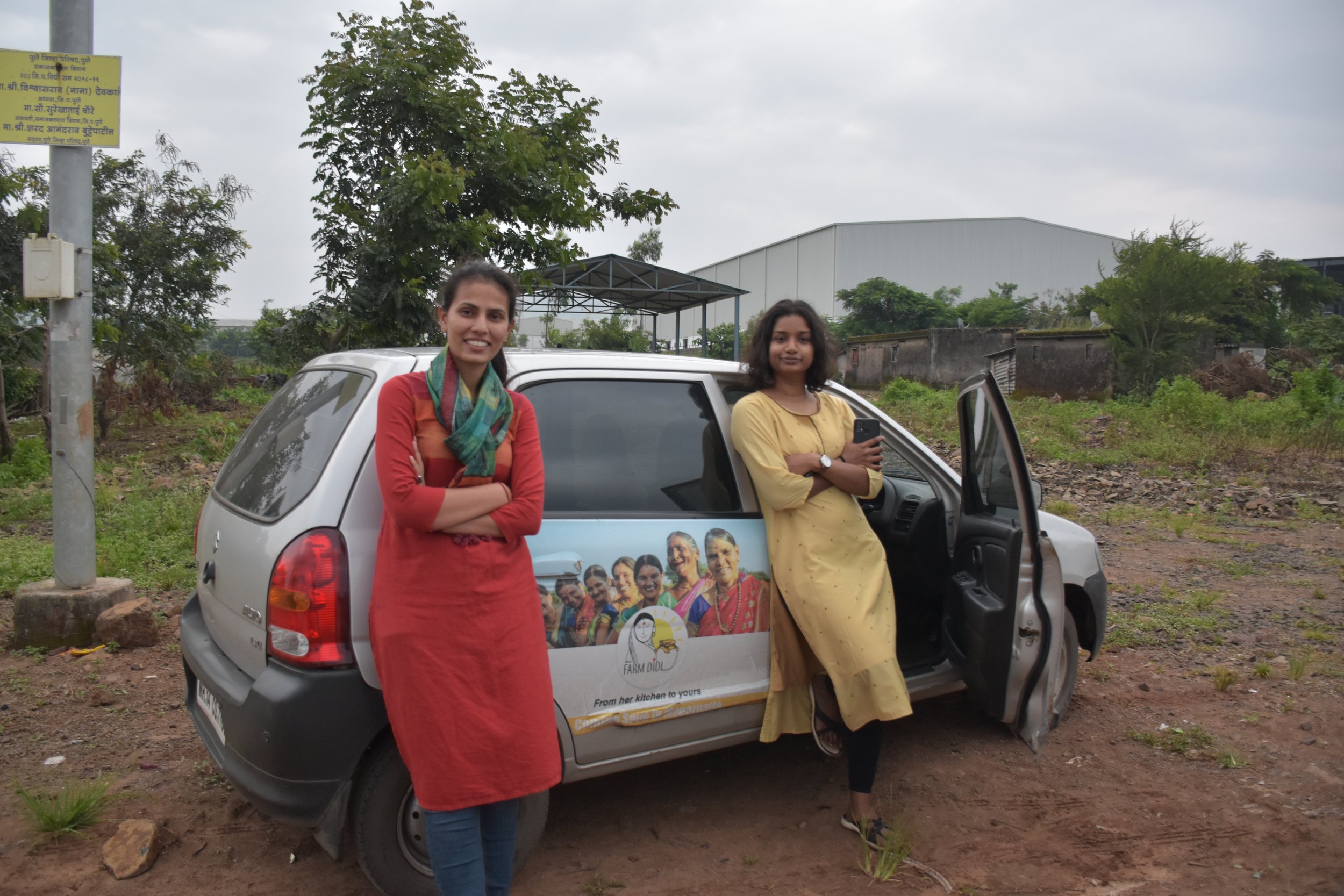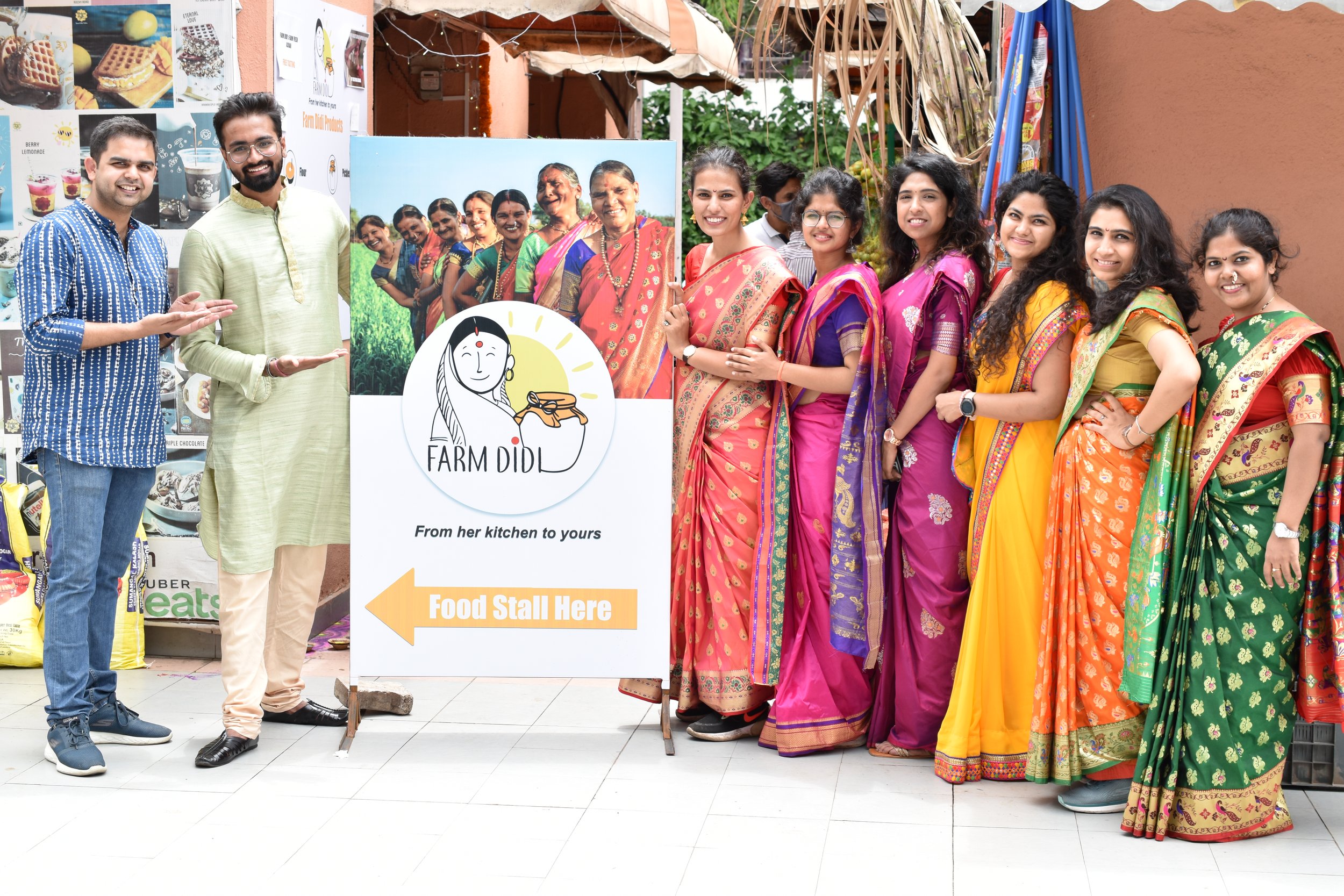Manjari and Asmita, Co-founders of FarmDidi, along with some of the FarmDidi team.
Manjari and Asmita are the founders of FarmDidi where they are on a mission to provide healthy, natural, and authentic food products by empowering over one million rural women. Their work is helping Farmer Didis (sisters) to become successful and compliant food entrepreneurs through services like food testing, compliance, packaging solutions, and training.
When Manjari was completing her MBA, she worked on a project studying women empowerment. During this time she encountered Self Help Groups (SHGs) for the first time. Through these groups she saw the real issues women of rural India face. “They were always super busy and multitasking. I was only a student researching women empowerment and they would ask me for ideas of what else they can do to increase the income of their family. This really surprised me because they are the real working women of India.”
After graduation, Manjari went on to join Kearney, a management consulting firm. While she traveled the globe and worked with fortune 500 companies, she could not help, but to think about the question the women from those SHGs had asked her, “Didi aur kya kar saktein hain?” (Didi what else can we do?)
Manjari felt she should be doing something to help rural India. After 5 years of working in management consulting, Manjari took some time off to travel through the villages in Maharashtra and talked to thousands of women. During this time, Manjari kept in touch with Asmita who had been her PG roommate and like a sister. They began working together to talk with other women to fully understand what rural women needed to start their own businesses.
Upaya’s Program Associate, Aditi Das, sat down with Manjari and Asmita to discuss their journey at length.
Q. What inspired you to start FarmDidi?
Manjari
For me, why I started the business is because I really wanted to be part of something that is super, super big. I think FarmDidi has the potential to take rural India forward. I have already seen that when women start earning money, they become role models in their villages and that inspires many other girls and shows boys that women can be business women. With FarmDidi, I see that I'm part of something big. It deals with solving for gender equality and at the same time food processing in rural India. This is going to create so many jobs in future. I can see purpose in what I'm doing right now. When I was in Kearney, it was great money, I traveled across the world, lived in seven star hotels and took business class flights, but I wasn't personally happy about it but I have found purpose by working on Farm Didi.
Asmita
I would like to start from the time I met Manjari, 15 years back. She's almost eight years younger than me. Then, I used to go to dance classes and was building my career and in front of me, was Manjari, who at that age, was doing social work and investing her time in something which is giving her purpose - she was getting enough peace, satisfaction and enjoyment. When I was with Manjari I was doing my MBA and both of us had that entrepreneurship keeda (entrepreneurship spirit) and we used to talk about innovative ideas and how we can start a new venture, for hours. Being an IT person I used to come up with a lot of ideas and we used to like to drill down to the details. At that time I did not know that after 15 years we'll be reuniting with FarmDidi.
After my MBA and marriage, I moved to Banglore but we were still in touch and would meet often. Couple of years back when she started thinking about FarmDidi, the idea was very vague but she reached out to me for input. I was always keen to learn about new technology and how the problems can be solved. So when I spoke to Manjari about FarmDidi it really clicked for me as I always wanted to use technology to really make an impact and solve problems at the ground level in India. Since my expertise is in tech I started helping her out with the FarmDidi app. At that time along with the didi business, I still had my job, 2 kids plus Covid also hit us! I was literally working 24/7 with no weekends for the last couple of years but I worked on. Then finally last year Manjari said that this was too much and we have to make a decision and do one thing. So I left my job and started working on FarmDidi and I am really happy that I'm doing something which is really making a difference.
Our startup is ever evolving - every day we are thinking of productive ways to make things work and the way we tackle challenges together is really enjoyable. We cannot stand a mundane life and live to tackle challenges and luckily it has worked out.
Q. Is there any unique challenge that both of you faced together? And when you do face such a challenge as a team, how do you work towards that?
Manjari
We came up with the app - Didi Business. After the lockdown we saw that didis started getting orders on Whatsapp and were selling directly. We onboarded 100+ didis and connected them to HORECA services with the help of the app. Soon we realized that it was not working out since the app was a bit complex for the didi's to understand. Another thing was that even if they got listed they did not know how to price their products. We had a lot of discussions about what to do and what the business model would look like since it was a mess. We eventually realized that we had to get into the nitty gritties to solve each of the unique challenges like pricing, quality, taste, and compliance.
This information helped us to discontinue working on the app, but rather focus on solving the challenges through spreadsheets, WhatsApp etc. and then come up with a business plan that is relatable and value generative for our didi's and also the business. I think Didi Business was a huge challenge for us and we went to and fro quite a bit about what we should do as a team!
Now, we have clarity after drilling down to the basics that even the small things matter. Of course we both do argue a lot with each other, but at the same we are like didi's (sisters) to each other. We know what dream we are chasing, what is the vision we have in our mind - so we work towards it collectively!
Asmita
As Manjari was saying that things were complex and weren't always going in the right direction. We thought let's bridge the gap between the didis and the retailers. We decided to have one single product - easy to make Jowar Bhakri by Nirmala didi, we set up a stall in Pune and started selling. We called our didis and asked them to dress in traditional attire and come to our stall to get people curious about our product. It was all so quick, within two weeks we were ready with the product, our didis and our team. I think the first day our stall was set up, is when our business took a U-turn and FarmDidi got a face. After that we knew our path, our bridge and decided to make it more concrete.
Manjari
Also by the time we finalized on our first product we had gotten very comfortable in trying and failing!
Q. Is there any motivational story that has really inspired you?
Manjari
We think we should start a fan page for our Rekha didi who coordinates our cluster in Aurangabad. When I started my research people asked me why I started from Aurangabad and it was all thanks to Rekha didi. She is so passionate and wanted to do something for her village and for women in general – I could see her selflessness. She’s always sharing stories about how she wants rural India to shape up! She was a trainer in the Paani Foundation so she used to share a lot of stories on water conservation and organic farming. She’s just 10th pass but she enrolled herself to get her 12th class certificate. She was also the distributor of sanitary pads in her village. She always gives her best for everything. I could feel the connection and her enthusiasm, I knew I had to work with her. Even though Aurangabad is a difficult place to deal in, Rekha didi made it worthwhile. She only has an acre of land but she is very hardworking and her husband is really supportive. She is our star didi and our inspiration. She even told us that when the CEO Paani Foundation visited he was given the pickle and somehow even Aamir Khan is eating our pickles!
Asmita
The first time I was introduced to Rekha didi it was on call and I felt like we had known each other from before since she is very friendly - thereafter I met her during our training. We call her diligently for our trainings since we want her to talk to other ladies about her experience with the FSSI licensing and inspire them.We really love her so we make sure that she attends the trainings to talk to everyone either physically or virtually - she talks about her story and how she has progressed. I really loved her mango pickle and really pushed Manjari to start with it and it sold like hot cakes!
Manjari
As soon as our mango pickle got sold out Rekha didi connected us with another SHG which made chikkis. The way Rekha didi talked to other SHG’s and us it seemed like FarmDidi is hers. She even introduced us to Vaishali didi who makes Nimbu (lemon) pickle. Before we finalized on Nimbu pickle, everyday she would get us different pickles to taste since she was very consistent. After many iterations she herself came up with the Nimbu pickle. Whoever orders it cannot stop talking about it! When we started Didi Business app, Vaishali didi forced her husband to buy a phone since she wanted to register on it.
Q. What impact do you want to see in your didis?
Manjari
Economic impact first – I want our didis to get regular and consistent income from the food they are producing. Second will be educational impact – we want their skills to continue to grow. As of now they are agricultural producers of crops but we want them to become certified and compliant food manufacturers. At the same time we believe that true empowerment will come from entrepreneurship and when the others in the villages see our didis becoming successful businesswomen, it will inspire future generations. This relates to psychological empowerment too.
Q. What is the one thing that does not let you sleep at night ?
Manjari
For me, it's the quality of food. Since we do not add any preservatives/chemicals, the chances of food getting spoiled is higher due to a variety of reasons like temperature, etc.. We are working on innovative and traditional ways to help stabilize the food so our consumers get healthy food.
Asmita
When we talk about quality, there are many factors to consider from how to prepare food, following FSSAI norms and regulations, basic hygiene requirements, packaging etc. Even after following these rules, since we do not add any preservatives, we have to find a way to reduce the puffiness. We are continuously engaged with food experts and testing with a variety of solutions. Now talking about Tech, I love solving complex problems. Sometimes there is just a small change in the code that can make a difference. Even when it's time to sleep and my kids call me, I cannot keep my laptop away if I have not been able to solve the issue.
Q. What advice would you give other aspiring entrepreneurs, especially in this sector ?
Manjari
Since there are a lot of stakeholders there are a lot of people-issues that you face, but do not lose sight of the bigger picture. Sometimes it is vital to be empathetic, but don't lose touch with your business acumen. I remember when we found out that the husband of one of the didis was cutting corners. Even after a few talks with the husband they continued to do it. At that point I got very emotionally attached and started to change my perspective. What is important is that FarmDidi as a company has to grow and it will only grow and it will grow only if everyone works together in a compliant manner. Having that emotional relationship with the didis is good but I now make sure I incorporate the business side too. Now when I talk to didis, I tell them that we are business partners. The bigger picture will be successful only if the business landscape is logical and structured. This was a great learning experience for me! Even if the didi is not seeing the big picture we need to show it to her, since the success of didis and FarmDidi go hand in hand.
Asmita
When you are looking at the bigger picture you need to be flexible in all aspects since your business will evolve. If things are not working out, do not dwell on it and think of another way to execute your plan. The aim is to be so flexible that the thought that “It is not happening!” will not cross your mind. I have seen businesses start and fail - the only way to go forward is to take any turn, but keep moving!



















The Tribal Hermit is a social impact venture that works closely with 130+ Dhokra craft artisans from Kondagaon, Bastar, and Raigarh districts of Chhattisgarh to design, create, and sell their products.